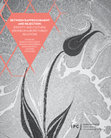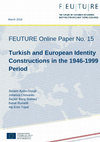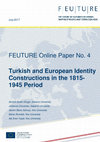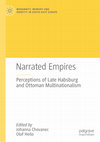Papers by Johanna Chovanec

Philosophy and Social Criticism, 2024
How does literature engage with the legacies of Empire? This article examines how imperial declin... more How does literature engage with the legacies of Empire? This article examines how imperial decline and nation building are reflected in textual production after the First World War. With Turkey as a case study, it focuses on the post-imperial narrative as a form of narration dealing with the experience of imperial loss, political contingency and possibilities of national belonging. I argue that Turkey's post-imperial condition is shaped by coming to terms with the loss of the Ottoman Empire, on the one hand, and a nationalising present embedded in the experience of Western-dominated modernity, on the other. Against this backdrop, I examine essays from the compilations Yaşadıgım Gibi (1970, 'As I lived') and Beş Şehir (1946, 'Five Cities') by Ahmet Hamdi Tanpınar, a key intellectual of the early republican era. The analysis of these post-imperial narratives reveals how Tanpınar tries to root Turkey's national modernity in selected elements of the imperial past. For Tanpınar, continuity with (Turkified) imperial heritage is a prerequisite for a strong nation-state.
IWMPost, 2021
Der Konflikt, ob die Türkei eher dem Westen oder dem Osten zuzuordnen sei, beschäftigte osmanisch... more Der Konflikt, ob die Türkei eher dem Westen oder dem Osten zuzuordnen sei, beschäftigte osmanische wie türkische Intellektuelle gleichermaßen. Als nach dem Untergang des Osmanischen Reiches das gesellschaftliche Leben in der Republik Türkei nach europäischem Vorbild reformiert wurde, brach der Schriftsteller Peyami Safa zu einer Reise auf. Sein Ziel: Europa zu suchen und zu finden.

IPC report, 2019
This report contains the proceedings of the expert session of the EUNIC-FEUTURE Stakeholder Confe... more This report contains the proceedings of the expert session of the EUNIC-FEUTURE Stakeholder Conference titled “Between Rapprochement and Rejection: Identity and Culture Drivers in the Europe-Turkey Relations” held at the Austrian Cultural Forum in Yeniköy, Istanbul, on September 14, 2018.
The contributions by Chovanec & Müller-Funk, Nocera, and Dominik discuss mutual identity representations in the literature and arts at the national level (Austria and Turkey by Chovanec & Müller-Funk; Italy and Turkey by Nocera; Poland and Turkey by Dominik); Levin’s contribution takes a broader look and underlines the history of the role
of identity in Turkey-Europe relations with a focus on its contemporary ramifications for the European Union’s relations with Turkey; and Costantini moves beyond identity representations to propose guidelines for a novel cultural policy in and for the Eastern Mediterranean.

This FEUTURE paper focuses on Turkey’s and Europe’s perceptions of each other in identity and cul... more This FEUTURE paper focuses on Turkey’s and Europe’s perceptions of each other in identity and cultural terms between 1946 and 1999. It identifies the identity representations developed by both sides in response to key selected political and cultural drivers of this period by subjecting selected newspaper articles and editorials as well as popular journals in Europe and Turkey to Critical Discourse Analysis (CDA). Identity representations are then discussed in relation to the pre-identified focal issues in the relationship; namely nationalism, status in international society, civilisation and state-citizen relations. The study finds that mutual identity representations in Turkey and Europe continue to be contested in this period. Yet, a growing convergence of English, French, and German representations of Turkey is observed on the European side whereas divergence of representations of Europe grows
on the Turkish front. While the establishment of the conception of multiple civilizations in both Europe and Turkey as well as the rise of nationalism in both contexts make it harder to justify policies aiming
at convergence throughout this period, it is observed that the rise of identity representations that focus on state-citizen relations have consistently supported convergence and that European identity
representations that focus on Europe’s status in international society have generally supported cooperation with Turkey in this period. Conversely, Turkish identity representations focusing on Turkey’s status in international society have become polarized and were employed in ways that justified both conflict and cooperation/convergence with Europe.

This FEUTURE paper focuses on Turkey's and Europe's perceptions of each other in identity and cul... more This FEUTURE paper focuses on Turkey's and Europe's perceptions of each other in identity and cultural terms between two periods: 1789-1922 and 1923-1945. It identifies the identity representations developed by both sides in response to key selected political and cultural drivers of these periods by subjecting the writings of prominent Ottoman bureaucrats and intellectuals in the first period as well as newspaper articles and editorials in Europe and Turkey in both periods to Critical Discourse Analysis (CDA). Identity representations are then discussed in relation to the pre-identified focal issues in the relationship; namely nationalism, status in international society, civilisation and statecitizen relations. The paper finds that there is no linear pattern to identity representations that are constantly contested in both the Turkish and European contexts. Certain positive and negative events trigger identity representations in novel ways, feeding into a set of relations which can be identified by conflict, convergence or cooperation.
IPC report, 2019
By means of literary texts from Turkey and Austria, this paper focus on the notion of melancholy ... more By means of literary texts from Turkey and Austria, this paper focus on the notion of melancholy as a main topos of the postimperial novel in Austria and Turkey. Nostalgic retrospection of the Habsburg and Ottoman Empires is a central theme in both countries’ literature and refers to different aspects such as the loss of order, stability, political weight,or cultural identity. The texts under analysis are written by Joseph Roth, Stefan Zweig, Claudio Magris, Ahmet Hamdi Tanpınar, Orhan Pamuk, and Elif Şafak.
Sprachkunst. Beiträge zur Literaturwissenschaft , 2017
Cut off from a suddenly frozen, immobile civilization, the protagonist of Marlen Haushofer's nove... more Cut off from a suddenly frozen, immobile civilization, the protagonist of Marlen Haushofer's novel ›Die Wand‹ finds herself trapped behind an invisible wall. This material boundary allows her to live a life characterized by the transgression of inner limits. Against the background of Edward Soja's 'thirdspace' theory it is argued that various binary oppositions are being deconstructed in the novel: isolation and socialization, man and woman, civilization and nature as well as human and animal.

Književna smotra, 2018
Der (Lebens-)Raum in Marlen Haushofers Roman "Die Wand" ist aufgrund einer über Nacht plötzlich a... more Der (Lebens-)Raum in Marlen Haushofers Roman "Die Wand" ist aufgrund einer über Nacht plötzlich aufgetauchten Wand zweigeteilt. Die materielle Grenze, als Voraussetzung dieser streng dichotomen Konstellation, wird für die Protagonistin des Romans zur Möglichkeit, ein vollkommen neues Leben der innerlichen Grenzüberschreitungen aufzubauen. Vor dem Hintergrund der Theorie des ‚Thirdspace‘ von Edward Soja wird im vorliegenden Beitrag dargelegt, wie in Haushofers Roman Grenzen, die zumeist auf vereinfachenden Kategorien beruhen, aufgebrochen werden. Das Konzept des Thirdspace wurzelt in einer radikal offenen Perspektive: Gedanklich konstruierte Grenzen werden aufgelöst. Ziel dieser Arbeit ist es zu zeigen, dass sämtliche binären Oppositionspaare, wie Isolation und Sozialisation, Mann und Frau, Zivilisation und Natur sowie Mensch und Tier im Roman dekonstruiert werden.
Book Chapters by Johanna Chovanec
Texts, Contexts, Intertexts: Studies in Honor of Orhan Pamuk, 2022
New Perspectives on Imagology, 2022
This article aims to show that imagology is a promising method for analysing images of the Europe... more This article aims to show that imagology is a promising method for analysing images of the European Other and the Turkish Self as expressed in Ahmet Hamdi Tanpınar’s novel Huzur (1948; trans. A Mind at Peace, 2007). The narrative challenges the rhetoric of early Turkish nationalism by promoting a synthesis of the national present with both the melancholically evoked Ottoman heritage and with European cultures. At the same time, the novel’s protagonists stand for diverse and often contradicting conceptions of Self and Other and thus provide an insight into the various identity conflicts present in Republican Turkey.
Routledge Handbook of EU-Mediterranean Relations, 2021

Narrated Empires: Perceptions of Late Habsburg and Ottoman Multinationalism, 2021
This chapter discusses the genesis of the ‘Ottoman Myth’ in Turkish literature, focusing on a bro... more This chapter discusses the genesis of the ‘Ottoman Myth’ in Turkish literature, focusing on a broad variety of retrospective narratives that are tied together by (post-)imperial melancholy. As a defining feature of the Ottoman Myth, melancholy results from the experience of losing a political, cultural, and symbolic order that is retrospectively and literarily remembered or imagined as Ottoman lifeworlds. ‘Empire’, or what is evoked as such, functions as a prism through which authors outline what is perceived as the ills of today, such as modernity, westernisation or nationalism. Melancholy is intrinsically connected to literary discussions about Turkish identity between East and West and links to broader questions about modernisation and progress. Through the analysis of literary texts written by Ahmet Midhat, Recaizade Mahmut Ekrem, Peyami Safa, Halide Edib Adıvar, Ahmet Hamdi Tanpınar, Orhan Pamuk, Elif Shafak, and Sema Kaygusuz this chapter explores how the Ottoman Myth has evolved throughout the history of late Ottoman and (post)modern Turkish literature.

Narrated Empires: Perceptions of Late Habsburg and Ottoman Multinationalism, 2021
Throughout the nineteenth century and into the twentieth century, the Habsburg and Ottoman Empire... more Throughout the nineteenth century and into the twentieth century, the Habsburg and Ottoman Empires struggled not only to implement legal, infrastructural and social reforms aimed at strengthening their own central power, but also to legitimise their rule through new frameworks of belonging. In an age of modern communications, and against the backdrop of an evolving public discourse, the creation of new identity narratives became not only dependent on the state, but also on the active participation of educated individuals who would show commitment to or rejection of the empire through newspapers, books and other written media. Outlining the main topics of the volume, this introductory chapter emphasizes how the promotion of narratives of multinationalism in both empires should be read against the background of an increased articulation of nationalist narratives among their diverse populations. These two intertwined strands of narratives have kept resounding after the empires were gone, informing current-day discourses of political homogeneity and heterogeneity, social closedness and openness.

Europa im Schatten des Ersten Weltkriegs, 2021
Mit dem Ersten Weltkrieg vollzog sich die intellektuelle Grundlegung der Reinen Rechtslehre, und ... more Mit dem Ersten Weltkrieg vollzog sich die intellektuelle Grundlegung der Reinen Rechtslehre, und dies „in dramatischer Verdichtung und Verquickung von Biographie, Wissenschaft und Politik“ (Busch 2011). Diese Dramatik und mit ihr die Voraussetzungen der Reinen Rechtslehre ideengeschichtlich deutlich zu machen, ist das Ziel unseres Beitrags. Gezeigt werden soll, dass es der von Hans Kelsen aus nächster Nähe beobachtete Zusammenbruch des politischen Systems der Donaumonarchie war, der zum rechtspositivistischen Denken führte, und dies in zweierlei Hinsicht: Zum einen ließen der Weltkrieg und der Untergang des Habsburgischen Großreichs das Vertrauen des politisch ambitionierten Juristen ganz von der politischen Ordnung zur Rechtsordnung übergehen. Zum anderen und darüber hinaus setzten die unvorstellbaren Ereignisse der Realgeschichte die Einsicht in die Kontingenz von Ordnung in einem Maße frei, das dem gewagten Denkweg Vorschub leistete, dass man eine verbindliche Grundnorm als Fiktion setzen müsse, um die Geltung der Rechtsordnung zu begründen.
Chovanec, Johanna: "Melancholie in der Literatur als Ausdruck des Habsburgischen und Osmanischen Mythos". In: Sturm-Trigonakis, Elke; Laskaridou, Olga; Petropoulou, Evi; Karakassi, Katerina (ed.): Turns und kein Ende. Aktuelle Tendenzen in Germanistik und Komparatistik. Peter Lang. p.171-186., 2017
Both the Austro-Hungarian Empire and the Ottoman Empire disintegrated after WW I. In Austrian lit... more Both the Austro-Hungarian Empire and the Ottoman Empire disintegrated after WW I. In Austrian literature, Claudio Magris proposes the Habsburg myth of post-imperial melancholy. This publication discusses the Ottoman myth of post-imperial melancholy as a main theme in Turkish literature.
Chovanec, Johanna: "Istanbul. Eine melancholische Stadt im Kontext des Osmanischen Mythos". In: Bobinac, Marijan; Chovanec, Johanna; Müller-Funk, Wolfgang; Spreicer, Jelena (Ed.): Postimperiale Narrative im zentraleuropäischen Raum. Tübingen: Narr Francke Attempto, 2018. p. 49-68.
This paper discusses the role of Istanbul in the genesis of the so called "Ottoman Myth", a conce... more This paper discusses the role of Istanbul in the genesis of the so called "Ottoman Myth", a concept developed to describe nostalgic references in Turkish Literature. By means of a three-phase model, melancholy as the main feature of the Ottoman Myth is discussed as a central post-imperial narrative in novels written by Orhan Pamuk, Ahmet Hamdi Tanpınar, and Yakup Kadri Karaosmanoğlu.
Books by Johanna Chovanec

This book examines the role of imperial narratives of multinationalism as alternative ideologies ... more This book examines the role of imperial narratives of multinationalism as alternative ideologies to nationalism in Central and Eastern Europe, the Balkans, and the Middle East from the revolutions of 1848 up to the defeat and subsequent downfall of the Habsburg and Ottoman empires in 1918. During this period, both empires struggled against a rising tide of nationalism to legitimize their own diversity of ethnicities, languages and religions. Contributors scrutinize the various narratives of identity that they developed, supported, encouraged or unwittingly created and left behind for posterity as they tried to keep up with the changing political realities of modernity.
Beyond simplified notions of enforced harmony or dynamic dissonance, this book aims at a more polyphonic analysis of the various voices of Habsburg and Ottoman multinationalism: from the imperial centres and in the closest proximity to sovereigns, to provinces and minorities, among intellectuals and state servants, through novels and newspapers. Combining insights from history, literary studies and political sciences, it further explores the lasting legacy of the empires in post-imperial narratives of loss, nostalgia, hope and redemption. It shows why the two dynasties keep haunting the twenty-first century with fears and promises of conflict, coexistence, and reborn greatness.

Die Autorinnen und Autoren des vorliegenden Sammelbandes untersuchen Umbrüche, Krisen und Widerst... more Die Autorinnen und Autoren des vorliegenden Sammelbandes untersuchen Umbrüche, Krisen und Widerstände in der Geschichte sowie der Gegenwart der Türkei. Im Zentrum steht die Frage, wie gesellschaftlicher und politi-scher Wandel in Kunst und Literatur verhandelt wird, welchen Einfluss er auf transnationale Migrationsbewegungen hat, wie er den urbanen Raum verändert und welche Rolle akademische Freiheit dabei spielt. Alleine drei Militärputsche formten die Geschichte des Landes in der zweiten Hälfte des 20. Jahrhunderts. Die anschließend einsetzende neoliberale Agenda der 1980er Jahre hatte nicht nur wirtschaftliche, sondern weitreichende soziale und kulturelle Folgen. Der Band verfolgt einen interdisziplinären und epochenübergreifenden Ansatz, der einerseits Wechselwirkungen zwischen Kultur und Politik untersucht und andererseits gesellschaftliche Strukturen in ihrer historischen Veränderlichkeit beleuchtet.

Bobinac, Marijan; Chovanec, Johanna; Müller-Funk, Wolfgang; Spreicer, Jelena (Ed.): Postimperiale Narrative im zentraleuropäischen Raum. Tübingen: Narr Francke Attempto, 2018.
Die Beiträge dieses Sammelbandes gehen aus dem internationalen Forschungsprojekt „Postimperiale N... more Die Beiträge dieses Sammelbandes gehen aus dem internationalen Forschungsprojekt „Postimperiale Narrative in den zentraleuropäischen Literaturen der Moderne“ hervor. Im Zentrum stehen die sich literarisch, kulturell und politisch manifestierenden Nachwirkungen von Großreichen in Mitteleuropa. Imperien wie die Habsburgische Monarchie werden als übernationale Räume von erweiterten Kommunikationsmöglichkeiten verstanden, in denen oft divergierende Narrative und Erzählstrategien entstehen, die sich in veränderter Form bis in unsere Gegenwart perpetuieren. In diesem Zusammenhang beleuchtet der Band Berührungspunkte im kollektiven Gedächtnis der Nachfolgestaaten und Konstruktionsprinzipien gemeinsamer kultureller Strukturen in Zentraleuropa.
Translations by Johanna Chovanec
perspektive : hefte für zeitgenössische literatur , 2021
Deutsche Übersetzung von Aysu Akcans Gedicht "ALMANCADA HER DUYGUYU ANLATABİLEN BİR KELİME VARDIR... more Deutsche Übersetzung von Aysu Akcans Gedicht "ALMANCADA HER DUYGUYU ANLATABİLEN BİR KELİME VARDIR" (zweisprachige Ausgabe)

Uploads
Papers by Johanna Chovanec
The contributions by Chovanec & Müller-Funk, Nocera, and Dominik discuss mutual identity representations in the literature and arts at the national level (Austria and Turkey by Chovanec & Müller-Funk; Italy and Turkey by Nocera; Poland and Turkey by Dominik); Levin’s contribution takes a broader look and underlines the history of the role
of identity in Turkey-Europe relations with a focus on its contemporary ramifications for the European Union’s relations with Turkey; and Costantini moves beyond identity representations to propose guidelines for a novel cultural policy in and for the Eastern Mediterranean.
on the Turkish front. While the establishment of the conception of multiple civilizations in both Europe and Turkey as well as the rise of nationalism in both contexts make it harder to justify policies aiming
at convergence throughout this period, it is observed that the rise of identity representations that focus on state-citizen relations have consistently supported convergence and that European identity
representations that focus on Europe’s status in international society have generally supported cooperation with Turkey in this period. Conversely, Turkish identity representations focusing on Turkey’s status in international society have become polarized and were employed in ways that justified both conflict and cooperation/convergence with Europe.
Book Chapters by Johanna Chovanec
Books by Johanna Chovanec
Beyond simplified notions of enforced harmony or dynamic dissonance, this book aims at a more polyphonic analysis of the various voices of Habsburg and Ottoman multinationalism: from the imperial centres and in the closest proximity to sovereigns, to provinces and minorities, among intellectuals and state servants, through novels and newspapers. Combining insights from history, literary studies and political sciences, it further explores the lasting legacy of the empires in post-imperial narratives of loss, nostalgia, hope and redemption. It shows why the two dynasties keep haunting the twenty-first century with fears and promises of conflict, coexistence, and reborn greatness.
Translations by Johanna Chovanec
The contributions by Chovanec & Müller-Funk, Nocera, and Dominik discuss mutual identity representations in the literature and arts at the national level (Austria and Turkey by Chovanec & Müller-Funk; Italy and Turkey by Nocera; Poland and Turkey by Dominik); Levin’s contribution takes a broader look and underlines the history of the role
of identity in Turkey-Europe relations with a focus on its contemporary ramifications for the European Union’s relations with Turkey; and Costantini moves beyond identity representations to propose guidelines for a novel cultural policy in and for the Eastern Mediterranean.
on the Turkish front. While the establishment of the conception of multiple civilizations in both Europe and Turkey as well as the rise of nationalism in both contexts make it harder to justify policies aiming
at convergence throughout this period, it is observed that the rise of identity representations that focus on state-citizen relations have consistently supported convergence and that European identity
representations that focus on Europe’s status in international society have generally supported cooperation with Turkey in this period. Conversely, Turkish identity representations focusing on Turkey’s status in international society have become polarized and were employed in ways that justified both conflict and cooperation/convergence with Europe.
Beyond simplified notions of enforced harmony or dynamic dissonance, this book aims at a more polyphonic analysis of the various voices of Habsburg and Ottoman multinationalism: from the imperial centres and in the closest proximity to sovereigns, to provinces and minorities, among intellectuals and state servants, through novels and newspapers. Combining insights from history, literary studies and political sciences, it further explores the lasting legacy of the empires in post-imperial narratives of loss, nostalgia, hope and redemption. It shows why the two dynasties keep haunting the twenty-first century with fears and promises of conflict, coexistence, and reborn greatness.
Myths and Narratives of Habsburg and Ottoman Multinationalism 1848–1918
1–3 November 2018, Copenhagen
https://modernity.ku.dk/calendar/myths-and-narratives-of-habsburg-and-ottoman-multinationalism-1848-1918/